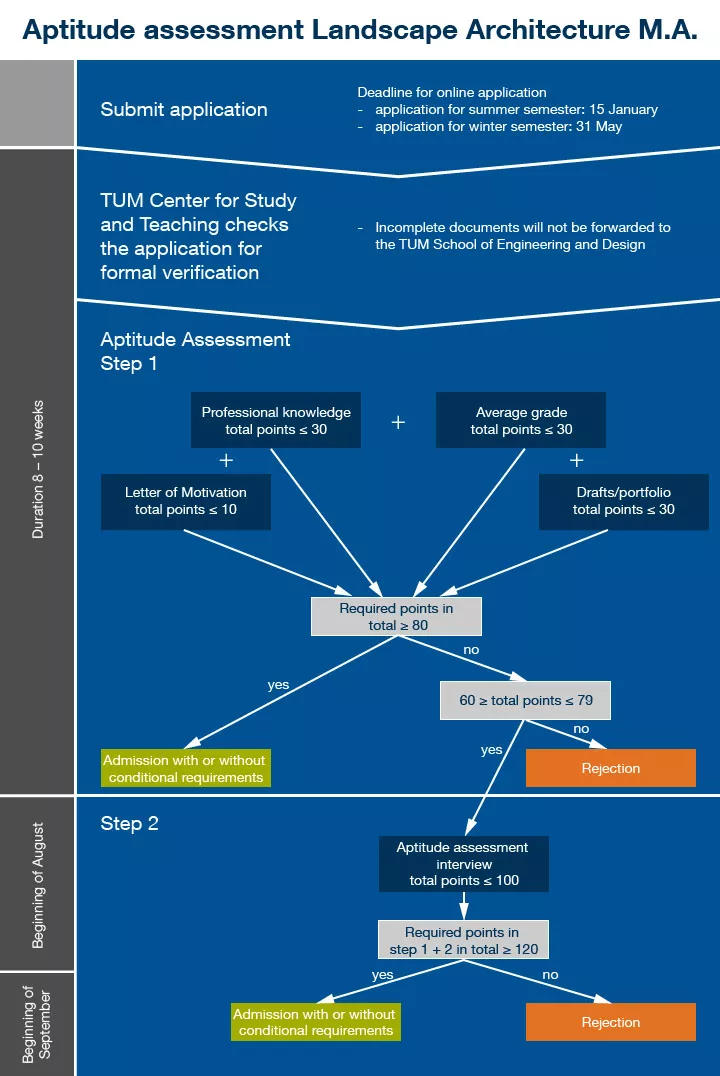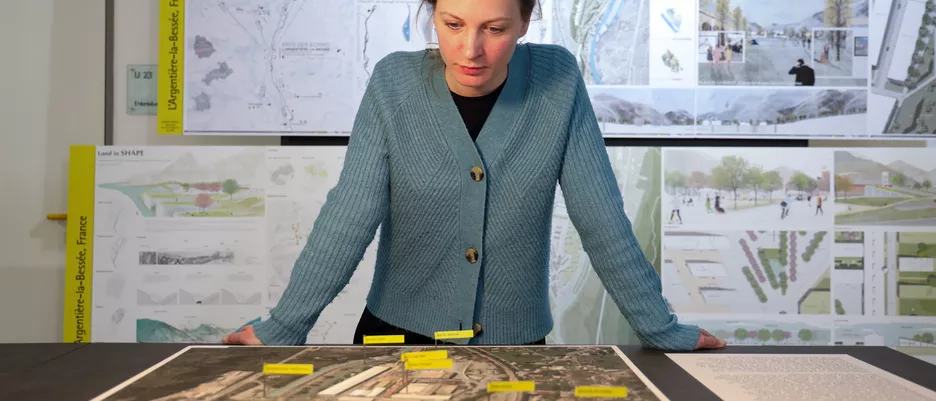Landscape Architecture M. A.
Do you want to create new open spaces in a high quality and sustainable way? Or transform existing landscapes - from historical city parks to rural natural landscapes? As a Landscape Architect, you will not only design aesthetic and artistic environments based on scientific and technical principles, but you will also make a significant contribution to ecologically and socially sound living environments. If you have a passion for nature, architecture and sustainability, the Landscape Architecture program is for you.
The repertoire of study projects ranges from cultural and natural landscapes in the Anthropocene to the energy landscape of tomorrow. Students learn to experimentally combine different methods in space-oriented design activities to address complex challenges of current and future open space planning and landscape development. Due to global climate change, the ecological, economic and social demands on sustainably designed high-quality open space systems are increasing. The Master's degree in Landscape Architecture therefore trains conceptual, landscape-based thinking. The special appeal of this challenging degree program lies in the combination of artistic-creative and research-based activities in interdisciplinary teamwork.
What you'll learn for your future?
Landscape architecture has a significant impact on the creation of sustainable and livable environments, whether in densely populated urban areas or in vast rural settings. As a graduate of our program, you will be able to analyze and meet complex demands to develop innovative solutions that combine the best of nature conservation, landscape management and quality of life. You will also test these solutions for their structural feasibility. Your work will take into account social and historical, ecological and economic contexts. In addition, you will have developed a broader understanding of natural and cultural science issues, which will enable you to work scientifically.
After graduation, you can work independently as a landscape architect, or take on leading positions in public building and planning authorities, as well as in private landscape architecture offices, engineering, and planning firms. Another option is to work in companies in the planning sector or in teaching and research institutions. The degree entitles and qualifies students for doctoral studies and opens up perspectives in various fields of research.
More information on the M.Sc. Landscape Architecture can be found on our TUM Landscape Architecture Wiki.
Type of Study: Full Time
Standard Duration of Studies: 3 Semester
Credits: 90 ECTS
Main Locations: Munich, Weihenstephan (Freising)
Admission Category: Aptitude Assessment for Master
Start of Degree Program: Winter Semester and Summer Semester
Application Period: Winter semester: 01.01. – 31.05. and Summer semester: 01.10. – 15.01.
Required Language Proficiency: English and German
Tuition Fees: for Students from Non-EU Countries
According to the model of two-tier programs, the three semester master's program in landscape architecture builds on the eight-semester bachelor's program in "Landscape Architecture and Landscape Planning" (240 ECTS) at the TUM School of Life Sciences or on equivalent programs at other universities.
Graduates of equivalent courses with less than 240 credits are required to make up missing credits from the bachelor course "Landscape Architecture and Landscape Planning" and in the professional internship (§35 and §36 examination and study regulations, FPSO). The period of study is thus generally extended by one to two semesters to a total of four to five semesters.
The first two semesters of study consist of project work (15 ECTS each) and supplementary elective modules. The third study semester is used to prepare for the master’s thesis (30 ECTS) which must be written independently within a period of six months.
More information on examination and study regulations (FPSO) can be found in the Study-Wiki.

The master’s degree program in landscape architecture is designed as a project study, with the focus on cooperative, interdisciplinary design projects (design studios). It is possible, in cooperation with the four core chairs, to set individual study priorities. The course includes the following components:
- cooperative project/design modules with special topics according to the orientation of the respective study focus (public space, regional open spaces, transformation landscapes, green technologies).
- project-/design-related modules (seminars, workshops, etc.)
- variable subject-oriented modules, closely related to the individual focus of study if required (lectures, seminars, exercises, etc.)
One project can be freely chosen for each semester, depending on the courses offered by the chairs. In each of these projects, a complex spatial design task is worked on with close reference to reality. The projects are supplemented by accompanying lectures, seminars, exercises and compulsory electives, depending on the standard duration of study and the individual focus.
In the first two or three semesters, the focus is on the design projects, each of which accounts for at least 50% of the total work required. The design projects deal with spatially relevant, current landscape architectural and social issues in relation to research fields. Students are free to choose from a wide range of elective subjects depending on the focus of their studies.
The first two semesters of study consist of the design project modules (30 ECTS), lectures and seminars (30 ECTS). If an additional semester has to be completed in accordance with §35 of the FPSO, this would consist of a project work (15 ECTS) and bachelor modules from the subject area of landscape architecture and landscape planning (15 ECTS).
The third semester or fourth semester of study is dedicated to the master’s thesis. The students develop individually their topic. The thesis can be a design project or a scientific-theoretical work on a topic relevant to current landscape architecture.
Within the design projects (design modules), small groups work together on complex tasks within a defined period of time, usually three months. The design projects cover different ranges of local, national, regional scales and focus on the topics listed below. Students can individually set their focus. The program is supported by four core professorships:
- The Chair of Landscape Architecture and Public Space (LAO) is involved with the moderation and design of development processes in cities and landscapes. The focus is on the careful design of urban spaces that meet the current requirements of social coexistence.
- With the subject area of Landscape Architecture of Regional Open Spaces (LAREG), work is carried out on the development of larger spatial contexts, characterized by cities and cultural landscapes and thus at the interface of open space theory, open space planning and landscape development.
- The Chair of Landscape Architecture and Transformation (LAT) deals analytically, conceptually and design-wise with the transformation of complex landscape (spatial) assemblages, especially with the re-use of disused production and infrastructure sites.
- The Green Technologies in Landscape Architecture (GTLA) tenure-track-Professorship develops innovative bio-engineering design approaches to develop new open space architectural typologies and investigates their spatial aesthetic impact and technical performance.
The Master’s program is an essential level for cooperation between the core professorships alongside the environmental design disciplines in teaching and research.
All Master's modules of the Landscape Architecture Chairs are offered in English or/and in German. That means you can complete the courses in either German or English. Bachelor modules (§35 FPSO) are available in German only.
Required language skills for admission: You need either sufficient German and / or English language skills if you wish to apply for this program. Evidence of your language proficiency has to be submitted before the end of the application deadline. Learn more about recognized certificates and other ways to prove your language skills.
This evidence of your language proficiency confirms that you comply with the minimum language requirements for admission to the program. Depending on the program and your individual background, it may be necessary for you to keep working on your language skills during your studies. Be sure to take a look at the services of our Language Center.
Provided that proof of a completed university degree for which less than 240 credits but at least 180 credits have been awarded, the prerequisite for admission to the master's thesis is evidence of 30 credits from the undergraduate course Landscape Architecture and Landscape Planning at the Technical University of Munich (§35 FPSO) as well as a six-month national or international internship in the professional field of landscape architecture equivalent to 30 credits (§36 FPSO). Such an internship as well as the missing 30 credits from Bachelor modules have to be proven by the beginning of the Master's thesis at the latest. The internship has to be organized by the student. It can either take place in an additional semester (six months) before the Master thesis or during the lecture-free period (accumulated internship time). The total internship period must be six months of full-time work. The duration of the course is thus extended to a total of four to five semesters. The course must be completed after five semesters at the latest, regulated by the study progress control.
Please apply through the TUMonline application portal and upload your application documents.
After the formal examination of the application (first stage of the admission procedure), a decision on admission will be made in a personal interview (second stage of the admission procedure).
Here, the assessment criteria focus in particular on the particular willingness to perform, the ability to work in a scientific or basic and method-oriented manner, existing specialist knowledge from the first degree in landscape architecture, independent knowledge in the design of open spaces and personal suitability as well as the ability of argumentation. Detailed information on the procedure can be found in the examination and study regulations (FPSO) for the master's degree in landscape architecture in the study wiki.
The following papers and documents are relevant to the application:
- Application for admission (print out, sign and upload)
- Curriculum Vitae in tabular form
- Diploma or Bachelor certificate; if this is not available, proof of study and examination achievements (Transcript of Records) is required
- Evidence of work and internship as well as other evidence of subject-specific additional qualifications
- Adequate knowledge of English, proof of English subjects in the Bachelor's degree or similar, or knowledge of German for non-German citizens, applicants from German-speaking countries or holders of a German university entrance qualification
- List of academic achievements (subjects and range of subjects/transcript of records)
- Meaningful portfolio with work samples (at least ten pages, according to the recommendation of the examination board no more than 15 pages, format DIN A4 or A3) to assess landscape architecture skills and knowledge:
For a meaningful portfolio, look for work samples (e.g. design and implementation plans) that clearly show their ability to provide excellent design and planning performance specifically in the field of landscape architecture. Outstanding theoretical contributions to current landscape architecture (scientific essays, specialist articles, internship reports, etc.) may also be included in the application portfolio in order to underpin your suitability for the Master’s programme in Landscape Architecture. - Letter of motivation: Convincing written justification for the choice of course is also required.
- For international applications students should use the pre-screening documentation from uni-assist.
Depending on your previous education and background, additional documents may be required (e.g. GRE, GATE, APS). You can find a complete list of the required documents after completion of the application in TUMonline.
The thematic focus of the aptitude assessment interview lies in the special willingness to perform, the scientific qualification, the specialist knowledge gained from the first degree, previous design experience and knowledge, and personal suitability.

